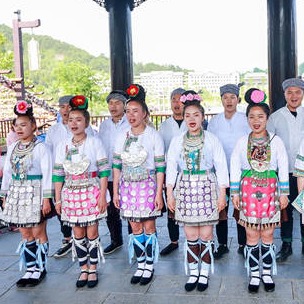Protecting the intangible takes a special touch


Qiu Chunlin, director of the Arts and Crafts Research Institute of the China National Academy of Arts, agreed that the development and utilization of intangible cultural heritage products and cultural differences in handicrafts should be based on some of the core elements of local intangible cultural heritage.
Cai Hong, a professor at the Capital University of Economics and Business in Beijing, said the charismatic little town of Danzha reflected to a certain extent that the integrated development of intangible cultural heritage and tourism is a great help in promoting rural revitalization.
An "ethnic medicine and famous doctor free consultation event" during the heritage week, hosted by the Chinese Medicine Coordinating Committee of the China Intangible Cultural Heritage Protection Association, also attracted much interest.
The committee invited representatives of well-known doctors from all over the country to allow tourists to take part in intangible cultural heritage projects of Chinese medicine. The appointment of the free clinic was fully booked within half a day on May 13.



































